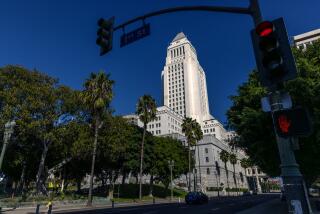Redondo Council Says ‘Cheese,’ Reverses Ban
REDONDO BEACH — With several private video cameras and the bright lights of two Los Angeles television stations aimed directly at them, City Council members this week retreated from their ban on videotaping council meetings, saying the prohibition was intended only to guarantee that the proceedings were not disrupted.
“This is a case of overreaction,” said Councilwoman Marcia Martin, who last week joined her four colleagues in banning video cameras from council chambers. “It is once again just people overreacting and not realizing the intent.”
The council voted 4 to 0, with Councilman Archie Snow out of town, to reverse the ban and to allow “any type of videotaping” at its proceedings. In a written statement distributed at the meeting, Snow said he did not object to videotaping “provided there is no interference with our deliberations.”
After most of the cameras and crowd left the meeting Monday night, the council made another surprise about-face, this time unanimously agreeing to consider cable TV broadcasts of its meetings. Just two weeks ago, council members declined by a 3-2 vote even to discuss Mayor Barbara Doerr’s suggestion that meetings be televised.
Called a Victory
Ann Baker, a Neighborhood Watch organizer who last week inspired the prohibition on video cameras when she taped the meeting for her group, called the reversals a “victory for open government.”
“People should have the opportunity to see what is going on,” she said. “Maybe they will think twice now before they ban something else.”
Councilman Jack Chapman, who last week proposed the ban on the video cameras, offered no explanation during the meeting for his change of heart. He said after the meeting, however, that public outcries about the prohibition and media coverage of it were “much ado about nothing.”
Chapman said his motion was designed to prevent disruptions during council meetings, not to keep out private video cameras.
Restriction Not Intended
“My intent was not to restrict any media or public person from any of the City Council meetings,” Chapman said. “How it got to where we are tonight, I do not know.”
But Baker called Chapman’s explanation “ridiculous,” saying that the councilman pointed directly at her when he made the motion. Mayor Doerr also disputed Chapman’s version.
“It was very clear it was to prohibit any video(taping) or filming. That is why Mr. Phillips jumped in,” she said, referring to City Atty. Gordon Phillips, who expressed reservations about the ban.
Official minutes from the meeting on Aug. 19 and an audio tape recording made by the city clerk indicate that the council did approve a motion barring video cameras from its chambers.
Two Motions
According to the tape, Chapman made two motions:
“I’d like to make a motion--that camera has been on us for 3 1/2 hours--I want to make a motion that since we are still discussing whether our City Council meeting should be televised or not on cable television, that we do not allow motion picture cameras or VCRs without prior approval of the council,” Chapman said.
After a brief discussion with City Atty. Phillips, who requested time to review a state attorney general’s opinion about taping public meetings, Chapman made a second motion to ensure that the ban was effective immediately.
“I’d like to make sure that during this process--during the determination of that opinion--that it be prohibited,” he said.
Mayor’s Warning
The second motion was approved 5 to 0, despite a warning from Mayor Doerr that the council might be overstepping its authority. “I wonder if freedom of the press is somehow included in that discussion,” she said.
But Chapman said after this week’s council meeting that his motion of a week earlier was misunderstood by the news media and Baker. “It had nothing to do with her,” he said. “The intent was that private people bringing cameras should be sensitive to a public meeting.”
The two reversals on Monday night came after Phillips issued a six-page memorandum on what legal rights the council has to restrict videotaping at its proceedings. Phillips ruled that video cameras cannot be prohibited unless the council “makes a reasonable finding that it creates a disturbance.”
Phillips cited portions of the Brown Act, a section of the California government code that deals with public meetings, in supporting his claim.
Permanent Recording
“The purpose of the section is undoubtedly to permit the permanent recording of public meetings or provide a greater distribution of the events of the meeting to those unable to attend,” he wrote.
The motion to consider broadcasting council meetings on cable TV was made by Councilman Ronald Cawdrey, who two weeks earlier had unsuccessfully supported Doerr’s proposal to consider the idea. Cawdrey said he would like to see five cameras in the chambers--two at the rear, one on each side, and one behind the council members.
The city staff will study the issue and report back to the council within 60 days, City Manager Timothy Casey said.
Video Camera Use in South Bay
Council Meetings Broadcast on Cable TV
Carson--none.
El Segundo--live and delayed tape.
Gardena--none.
Hawthorne--delayed tape.
Hermosa Beach--delayed tape.
Inglewood--occasionally, delayed tape.
Lawndale--none.
Lomita--none.
Los Angeles*--none.
Manhattan Beach--delayed tape.
Palos Verdes Estates*--none.
Rancho P. V.*--delayed tape.
Redondo Beach--none.
Rolling Hills*--none.
Rolling Hills Estates*--none.
Torrance--live and delayed tape. *Only portions of the city are offered cable service. Source: city hall officials
More to Read
Sign up for Essential California
The most important California stories and recommendations in your inbox every morning.
You may occasionally receive promotional content from the Los Angeles Times.










